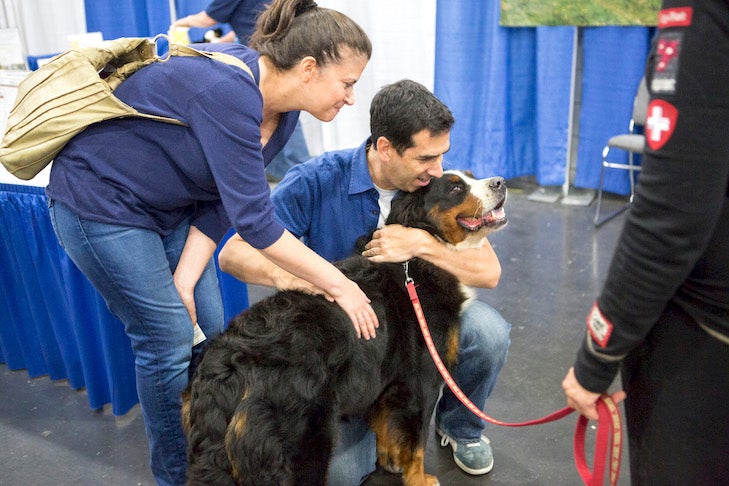
So, you’ve decided to rescue a dog. Now what? Between the internet, social media, and suggestions from friends, there is a bewildering sea of options out there. This guide will help you figure out if rescue is the right choice for you, how to know which dog rescue groups are reputable, and how to choose the right rescue group.
How do I know if I want to rescue a dog or purchase a puppy?
One of the biggest benefits of responsibly bred dogs is that they are predictable. While many families, especially those with children, prefer to purchase a purebred puppy from a reputable breeder who has health- and temperament-tested their dogs, some prospective dog owners may decide an older dog is the best fit.
The first step in deciding if you want to rescue a dog is to consider your circumstances. What kind of dog are you looking for? Will your dog be around children? How much time/money do you have to dedicate to training and medical expenses?
I want a purebred dog. Are there purebred rescue groups?
Yes! Many AKC breed clubs devote time and resources to rescuing dogs of the breed. The AKC Rescue Network is a good resource when you’re looking for a dog of a specific breed. Many breed clubs, like the Bulldog Club of America, handle breed rescue directly, while other clubs like the Golden Retriever Club of America provide resources such as coordination, online listings, fundraising, and grants to dozens of local breed rescue organizations.
Dogs may be surrendered to the breed rescue if there’s a change in family circumstances, like a death, divorce, or relocation. Some are returned because the current owner couldn’t fulfill the dog’s needs. Regardless of the reason or circumstance, rescue is important to AKC breed clubs and always has been.
Nicole Morrison, former rescue volunteer and the legislative liaison for the Cavalier King Charles Spaniel Club of Greater Houston is one of many AKC breed club members that work to place rescue dogs.
“No dog bred by a member of an AKC breed club should end up in a shelter,” Morrison says. “Members are responsible for every life they bring into the world.”
What is meant by a ‘reputable rescue group?’
The best and most reputable resources for finding a rescue dog are located in the AKC Rescue Network. Beyond these resources, there are several things to look for when researching various rescue groups that will help you to determine which are trusted.
-
- The group’s knowledge of their dogs. A reputable group will have vetted the dog’s health as much as possible. At the very least, they should know whether the dog has been spayed or neutered, whether they’ve seen a vet, what health records exist for the dog, and what treatments, such as de-worming, have been provided. Ideally, they’ll also have information about the dog’s temperament and personality.
- The group’s transparency. Usually, a reliable group will display its non-profit status, board of directors, and tax status. Morrison affirms that, in these days of internet search, rescues should have some online presence as well as a physical address and phone number. Ask if the group is registered locally or with the city, county, or state. Many locales don’t have any sort of registration or inspection process, but if your area does, you should know whether the group has complied.
- The group’s “vibe.” Rescue groups are normally made up of volunteers who put a lot of heart into their work. The people you come into contact with should seem happy and committed to working with the group. At the least, there should be a general sense of well-being and organization.

Does getting a puppy from a breeder hurt rescue dogs?
Put simply: no. There are many misconceptions out there about rescue dogs. In fact, a groundbreaking study by the National Animal Interest Alliance (NAIA) reported that dogs entering U.S. shelters reached an all-time low in 2015. In addition, the number of purebred dogs in shelters dropped to about 5 percent.
This is encouraging news for dog owners and lovers everywhere. The study is significant because it reveals common misconceptions about purebred dogs in shelters. It also exposes the fallacy that dog purchasers who prefer purebred pets somehow hurt a dog in a shelter through their choice.
The NAIA credits organizations like the AKC for “encouraging pet owners to select their pets more carefully, neuter dogs not intended for breeding programs, and understand the lifelong commitment that responsible dog ownership requires.” The study also commended AKC breed rescue groups that work directly with shelters to save purebred dogs suitable for rescue.
According to the American Pet Product Distributors Association (APPA) annual survey, the demand for dogs in the United States continues to increase, even as lawmakers continue to restrict domestically-raised dogs.
Ironically, to meet the increasing demand for dogs and to continue to offer rescue pets, many shelters and rescues now import dogs from overseas. The National Animal Interest Alliance (NAIA), which leads national efforts in collection and analysis of shelter data, estimates there are as many as one million dogs imported annually. While this may at first sound like a good solution, the truth is that massive imports of animals of unknown origins without appropriate health checks put both pets and humans at risk.
Directly related to irresponsibly imported pets, the U.S. has experienced an increase in instances of dogs with rabies (including the canine variant that had previously been thought eradicated in the U.S.), canine flu, screwworm, brucellosis, and more infectious diseases.
As a general rule, responsible dog rescues will not import dogs from outside the U.S., especially without individual vet examinations. Knowing where your rescue group acquires their dogs is extremely important.
Where and how do rescue groups acquire the dogs?
Most dogs being cared for by all-breed rescue groups come from shelters or from extreme situations, like hoarding or natural disasters. The majority of dogs in breed club rescues are relinquished by individual owners. Around one third come from shelters, animal control, and dog pounds.
Dogs come to rescues from all over the country, depending on the region. In the Northeast, for example, many dogs come from shelters in the South. The rescue group often arranges for transport to the dog’s new foster home. Many rescue groups develop relationships with shelters, then negotiate with those shelters to pull dogs to foster. Almost all AKC breed clubs (93.4%) say their rescues are fostered in volunteer homes.
Before dogs go to foster homes, rescue groups gather as much information from the shelter as possible. This includes information about the dog’s health, temperament, vet care, and existing records.
There’s been some controversy recently about specific rescue groups purchasing dogs at auction or directly from breeders. The AKC’s official position statement is that the purchasing of dogs at auctions is not overall in the best interest of purebred dogs.
“No reputable rescue organization should be in the regular business of purchasing from any source,” agrees Morrison. She adds that there may be extreme situations when a group agrees to re-home purchased dogs. However, the rescue group itself shouldn’t be involved in funding or purchasing from an auction.
What’s the process for acquiring a dog from a reputable group?
Expect a thorough process when rescuing a dog. This may include:
-
-
- an application
- a phone interview
- a home visit
- meeting the dog, if you haven’t already
- introducing the dog to your current pets and family members
- signing a rescue contract
-
If the dog is currently staying with a foster family, the family will often have a say in the decision. They’ve put a lot of time, effort, and love into the dog and will want to make sure it goes to a good home.
This is also your opportunity to ask questions. The foster family can give you detailed information about the dog.

What questions should you ask before rescuing a dog?
-
-
- Do you know why the dog was surrendered or returned?
- Does your rescue group have any sort of trial period? (This varies from group to group.)
- Can you help me find a trainer, animal behaviorist, or other specialists?
- How long has the group been in existence? (A long history is great, although a new group may be equally as reputable.)
-
Not only is this process in the best interest of the dog, but it also will give you a chance to be absolutely sure that this is the dog for you. It will also help ensure that you’re prepared to be a responsible dog owner, and that everyone living in your home is ready for the new addition.
Red flags that should warn you away from a rescue group
Even if you think you’ve found the dog of your dreams, be aware of warning signs that mean the rescue group, or even the dog, is not as it should be.
-
-
- The group asks you to commit to a dog before you meet them.
- They don’t provide you with medications and/or clear health records.
- They don’t make it clear that, if it doesn’t work out, the dog must be returned to the rescue group.
- They don’t do some combination of phone interview, vet check, or home visit. Some groups may ask you for personal or veterinary references as well.
- They are not registered as a non-profit. Typically, a rescue group is a 501(C)(3) organization.
- They do not provide a written agreement spelling out the terms of the rescue.
- They don’t provide references from veterinarians or past rescuers if you ask for them.
-
The dog rescue process takes homework and patience. You may find a dog that seems like a good fit, but the rescue group may seem unreliable or untrustworthy. Alternately, you might find a great rescue group, but they don’t have the perfect dog for you right now.
A group might also say that you cannot rescue a specific dog. The group may think you’re a wonderful person, but just not the right fit for that specific dog. For example, a person who is fairly sedentary might not be able to give an active dog the exercise they need. Likewise, someone who is gone for many hours a day wouldn’t be a good match for a dog with separation issues.
At the end of the day, becoming a dog owner should be fun when done responsibly. Working with a reputable rescue group or breed club is a collaborative process and is important to ensuring a successful and satisfactory outcome for everyone involved.

